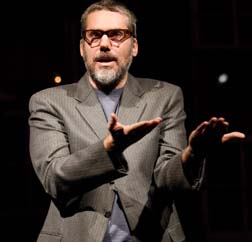|
Lucy Komisar
|
 |
| "THIS" -- Glenn Fitzgerald, Eisa Davis, Darren Pettie, Julianne Nicholson, Louis Cancelmi. Photo by Joan Marcus. |
Melissa James Gibson has a ready wit and clever way with words. In this stage-of-life play, she uses that talent to examine the lives of four college chums who have stayed close friends, for good and for ill, into their late 30s. It's not a deep play, but it's engaging. In a sympathetic, non-judgmental way, she deals with friendship, the dissolution of marriage, adultery, personal loyalty, death, and the desire for a meaningful life.
Though she never gets below the surface, she doesn't make you think you are watching television (a high compliment also to director Daniel Aukin), though a friend said it reminded her of the series "Thirty Something," which I never saw.
In several apartments, (set by Louisa Thompson), the friends get together for dinner and drinks, to soothe and to hurt each other. They would be in a cocoon were it not for a visiting Frenchman, Jean-Pierre (Louis Cancelmi), an official of the Paris-based Doctors without Borders (Médecins sans Frontières), who reminds them and us of the suffering world out there.
Gibson has created the perfect foil for the others' self-involvement. At one point Jean-Pierre answers his cell phone and fires off a conversation in rapid French, beginning with, "They shot at the ambulance?!"
 |
| Eisa Davis and Darren Petti. Photo by Joan Marcus. |
The men are jealous and the women are attracted to Jean-Pierre. Tom (well played by Darren Pettie as a psychologically closed-up character) quips, "I'm a cabinet maker without borders." Alan (Glenn Fitzgerald), the gay friend who makes his living as an entertainer doing feats as a mnemonist – someone who remembers everything – is an unhappy guy and would like to join Jean-Pierre's organization for a "do good" job. Fitzgerald exudes distress.
Tom's wife Marrell (a warm but vulnerable Eisa Davis) is a cabaret singer, quite a good one from her jazz number. (The first rate songs have lyrics by Gibson and music by Peter Eldridge.) Their friend Jane (a very fragile Julianne Nicholson) is a poet and college instructor in an unsatisfying job.
Marrall is black, as was Roy, Jane's husband, who died a year ago. The others are white. Both marriages produced children. Tom and Marrall are going through a hard patch, including one of them not wanting sex, though in confidences to Jane, each blames the spouse. No one comments on the difficulties of interracial marriages, so apparently there haven't been any.
 |
| Darren Pettie, Julianne Nicholson. Photo by Joan Marcus. |
For a gaggle of friends who care about each other, they show extreme insensitivity. The first example is a parlor game in which they make Jane the foil. She is told they have made up a story, but they haven't. When she asks yes or no questions, they answer depending on whether the question ends with a vowel, a consonant or "y." Her questions expose and wound her. They don't seem to care. It's a first clue that this four-some is not as caring as they pretend.
The group crisis is exacerbated by a sexual betrayal, and then a confession by Jane which is a very unlikely turn of the script. Gibson apparently needed it to move the plot, but it's not very believable, unless it, too, was meant to wound.
When the issue of adultery inside the group is broached, Jean-Pierre adds some perspective by reminding them that what is really upsetting is the misery in Africa, not what people do with their bodies.
The back story, which arrives as an afterthought, is Jane's inability to deal with the death of her husband, which has left her so out of it she forgets to pick up her daughter after school.
There are funny bits such as a shtick about the right to use language that belongs to another "group." Alan protests when Jane says she feels "schvitzy" because that is Jewish and she isn't. She ripostes, "That's like me telling you to stop using all the WASP-y words… like wainscoting….Yes, I'd like you to stop saying wainscoting."
Alan muses, "I think maybe I'd make a Great Merchant, Or or I know, a Moneylender, or a Moneylender Without Borders." And the two race to outdo each saying the Kaddish at break-neck speed.
The actors are all excellent, with portrayals that are more than believable. But the ending is abrupt and corny. Maybe this really could have been on "Thirty Something."
| lobby | search
| home | cue-to-cue |
discounts | welcome | film
| dance | reviews
|
| museums |
NYTW mail | recordings |
coupons | publications |
classified |

